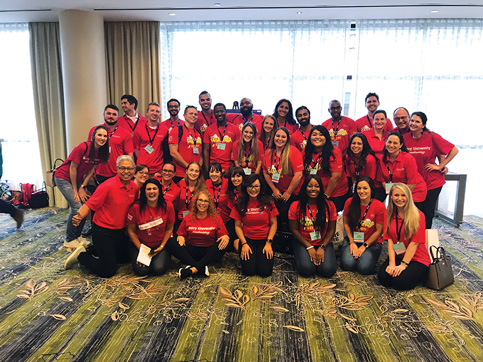Barry University, Florida Memorial, St. Thomas band together

Within the past two years Florida Memorial University, Barry University and St. Thomas University have all appointed new presidents and focused on visible new initiatives, and now they are collaborating with each other to address challenges brought about by the coronavirus pandemic.
David Armstrong, who was appointed president of St. Thomas University in 2018, told Miami Today that the three universities had worked together to meet the needs of their students and communities during this unique and trying time.
“We’ve been working together in dealing with Covid-19 because we serve a very similar clientele,” he said. “If one of us has a good idea, we share it.”
According to Dr. Armstrong, this collaboration has included discerning best practices for opening campuses, continuing to serve students during the shutdown, and addressing political processes.
Jaffus Hardrick, who has served as Florida Memorial’s president since 2018, said the three schools together approached local government for permission to keep campuses open as essential entities, allowing them to continue to house and provide services for students.
“We realized we were dealing with some of the same issues,” he said, “so we talk about how we can, as we move forward, continue to work together to make sure none of our students fall through the cracks. We’re here to lift up and support each other.”
“I think we’ve drawn a lot of information and comfort in discussing these difficult decisions that we’re all navigating, particularly as they relate to the safety and well-being of our students,” said Mike Allen, who began his tenure as Barry’s president last July.
One decision all three universities have made is to reopen this fall, albeit with new safety measures in place. According to Dr. Hardrick, some of these measures at Florida Memorial will include smaller classes, sanitation stations, mandatory face coverings, protective shields for teachers, and sanitation of classrooms after each use.
“It’s our intention to have an in-person living environment on campus in the fall,” said Dr. Allen, “and we’re all following the guidelines from our state and local authorities to figure out how to do that with the safety of our campus community at the forefront.”
Part of Barry’s plan involves tasking its Health and Safety Task Force with mapping out a plan for what campus life will look like in the fall, including everything from how dining halls will operate to how the school will respond in the event of a Covid-19 positive case on campus.
In addition to addressing coronavirus-related challenges, since assuming their positions each president has focused on initiatives to help their schools grow and improve.
According to Dr. Hardrick, Florida Memorial is planning to increase academic offerings by creating a doctoral program, developing specialized certificates in fields such as healthcare analytics, and expanding the school’s aviation program, which currently focuses on courses for students who desire careers as pilots or air traffic controllers, to also include a maintenance track.
In addition, for the first time in 61 years Florida Memorial’s football team will take the field this fall as part of the National Association of Intercollegiate Athletics. Dr. Hardrick also said this will also be the first season for the school’s new “Roar Marching Band.”
“For me there are two critical goals,” he said, “and those are to integrate Florida Memorial University into the greater community and to elevate its prominence on a global level.”
One of those goals, he said, begins with improving branding and ensuring that the success stories of students and faculty at the university do not go untold. “We have to do a better job of building relationships in the community and getting people to know who Florida Memorial is,” he said. “The university has to be able to show how it’s having an impact.”
Indeed, each president told Miami Today that improved branding and community relations were important goals for their universities.
According to Dr. Allen, some of Barry’s most important offerings felt like secrets. “One of my biggest undertakings my first year,” he said, “was to raise visibility at Barry. We offer so many great things to our students and contribute so much to our community.”
One of the most important aspects of this messaging, he said, was to promote the efforts Barry makes to work with students undergoing financial hardships, including the 70% of its students who are eligible for federal Pell Grants, which are awarded to undergraduates who display exceptional financial need.
“An important part of the story that gets lost is who we serve,” he said. “We provide a path to social mobility for very deserving students; we work really hard with [students] and their families to make Barry an affordable place. We want to tell that story because that is one of the greatest contributions we make back to the South Florida community.”
During his tenure Dr. Armstrong has also dedicated attention to improving St. Thomas’s branding, which is one key facet of the school’s “Limitless: 2020-2025 Strategic Plan.” According to the plan, the university aims to develop a master marketing plan and rebranding effort that will strengthen the school’s Catholic and Miami identities.
“Our location is a very important part of what we do and who we are,” said Dr. Armstrong, who added that 81% of the university’s students are racial minorities. “Miami is the gateway to Latin America,” he said. “It’s a very progressive and diverse place, and so is our university.”







Recent Comments